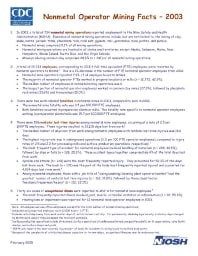Mining Publication: Nonmetal Operator Mining Facts - 2003
Original creation date: February 2005
Authors: National Institute for Occupational Safety and Health
NIOSHTIC2 Number: 20025917
U.S. Department of Health and Human Services, Public Health Service, Centers for Disease Control and Prevention, National Institute for Occupational Safety and Health, DHHS (NIOSH) Publication No. 2005-121, 2005 Feb; :1 pp
In 2003, a total of 734 nonmetal mining operations reported employment to the Mine Safety and Health Administration (MSHA). Examples of nonmetal mining operations include, but are not limited to, the mining of clay, shale, barite, potash, trona, phosphate rock, rock salt, gypsum, talc, gemstones, mica, perlite, and pumice. A total of 19,333 employees, corresponding to 20,314 full-time equivalent (FTE) employees, were reported by nonmetal operators to MSHA. This is a 1% decrease in the number of FTE nonmetal operator employees from 2002. There were two work-related fatalities in nonmetal mines in 2003, compared to zero in 2002. There were 506 nonfatal lost-time injuries among nonmetal mine employees, occurring at a rate of 2.5 per 100 FTE employees. These injuries resulted in 22,125 days lost from work. Thirty-six cases of occupational illness were reported to MSHA for nonmetal mine employees

NIOSHTIC2 Number: 20025917
U.S. Department of Health and Human Services, Public Health Service, Centers for Disease Control and Prevention, National Institute for Occupational Safety and Health, DHHS (NIOSH) Publication No. 2005-121, 2005 Feb; :1 pp
- Coal and metal/nonmetal mining facts - 2008
- Coal and Metal/Nonmetal Mining Facts - 2008 (HTML)
- Coal Contractor Mining Facts - 2001
- Coal Contractor Mining Facts - 2002
- Coal Contractor Mining Facts - 2003
- Coal Contractor Mining Facts - 2004
- Coal Contractor Mining Facts - 2005
- Coal Contractor Mining Facts - 2006
- Mining Fact Sheets
- Rib Falls: A Major Ground Control Issue